Heartbroken Scotland will rise again after World Cup blow
- Published
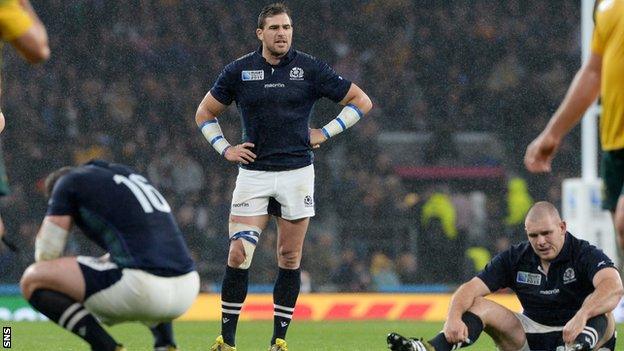
Scotland were close to causing a major upset at the World Cup
The combined genius of Burns, Banks and Boswell, a formidable front-row of Scotland's literary giants, would have struggled to do justice to the drama at Twickenham.
Then again, maybe they wouldn't have needed to. Words seemed superfluous when the images were so stark.
On one side, the joy and undiluted relief of the Wallabies who got out of jail in the end with a mixture of their own never-say-die, some wretched refereeing and a cataclysmic Scottish line-out.
Down the other end, sporting horror. The Scots stood rooted to the spot at the death, in shock and disbelief at how close - how outrageously and painfully close - they had come to pulling off a seismic victory.
We'll get to the anger that followed. We'll deal with Craig Joubert, the referee, but before we go there let's go back to a Scottish line-out with two minutes left to play.
Scotland had the lead, 34-32. They had just inflicted further damage on an Australian scrum that had gone from wrecking ball against England to something more akin to a pop-gun against the Scots. They had the ball in the hands of their replacement hooker, Fraser Brown, and they had control of their destiny.
The rain was falling and the darkness had closed in. In the mind's eye we could remember this kind of scene from before, at Murrayfield, when grim conditions accompanied some famous Scotland victories.
The weather, the floodlights, the aesthetic seemed perfect. It was just this line-out. This one, decisive, maybe historic line-out.
It had gone wrong 15 minutes earlier and it had cost Scotland a converted try. This time it had to be the percentage call; safe ball thrown to the front or middle, gathered and protected like a new-born baby while the clock ticked down all the while. Only it wasn't.
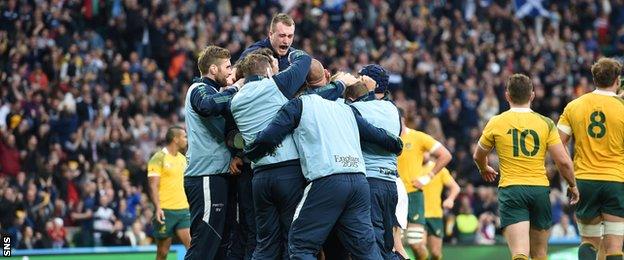
Peter Horne (hidden) put Scotland into a first half lead
The ball was called long and the ball was lost. Australia had hope again - and a chain of events was set off that ended with those images of devastation in the aftermath.
What happened next will be the source of bitterness and rancour until the end of time. Craig Joubert is now, to Scots, the rugby equivalent of Butcher Cumberland., external
It wasn't just the fact that he got his call hopelessly, and head-wreckingly, wrong in giving Australia the match-winning penalty. It should have been a scrum, not a chance for Bernard Foley to drive a dagger into the heart of the Scots.
It wasn't just the fact, either, that before the fateful line-out that led to the fateful penalty Joubert had missed a late tackle on Stuart Hogg and then, inexplicably, declined to go and check it on the big screen. Why would he not check it? It's the dying seconds of a World Cup quarter-final. You check it.
Joubert was a catastrophe for many reasons. A sin-binning for Sean Maitland early in the second half was another ludicrously harsh call. Australia would have had their own gripes, no question. They, too, had plenty of cause for protest, but winners don't protest. Winners advance and say nothing.
The South African's piece-de-resistance came right at the end, though. Not the Hogg incident or the penalty that should have been a scrum, but his sprinting from the field on the full-time whistle, like a scalded cat, without having the respect to stand and shake hands with two monstrously brave sets of players and, yes, take the heat of the crowd into the bargain.
Joubert ran away. On a day that contained so many heroic performances, his last act was to turn on his heels and disappear.
This was a day of days, but also a day that will haunt Scotland. It was a reprise of what happened to Ireland in the quarter-final of the 1991 World Cup against the same opposition. Like Scotland, the Irish only had to wind the clock down to win a sensational victory. Like Scotland, they couldn't do it.
One of the Irish players that day, their prop Des Fitzgerald, said recently that he still has nightmares about it, still wakes up in a cold sweat at the memory of it all. Twenty-four years later and haunted. That's the fate that awaits Scotland.
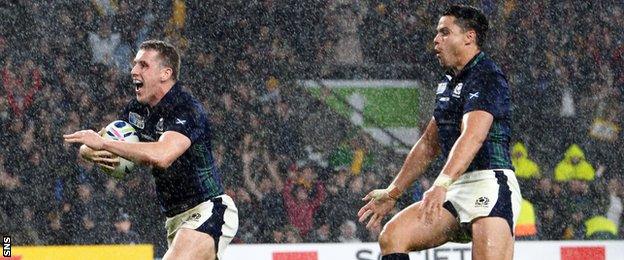
Mark Bennett's (left) try late on had Scotland on the verge of a famous win
We could be here all day talking about what they got right and how far removed this performance was from much of the garbage Scotland has produced in the last 16 years. They had huge men in so many parts of the field and there is light ahead. The sun will come up tomorrow even if Greig Laidlaw's players have the curtains drawn and don't want to see it.
They're heartbroken, but they're pounding forward as a team. They're young and have much to learn about the street-smarts of life at this level, but there's enough progress to get you excited.
Alas, not enough to get them further in this World Cup.
On the day, they overcame an early hammer blow from Adam Ashley-Cooper and powered their way into the game. They had a magnificent edge, a power that Australia found hard to quell.
And, at last, they had possession. Lots of it. They drove hard and direct at the Wallabies and Peter Horne went over at the side of a ruck. Then, Foley dropped a ball and Scotland nailed a scrum and Laidlaw's dead-eye put his team 13-5 ahead after the first quarter.
Some of us started to lose faith after that. Not the players, but many others. Australia wing Drew Mitchell scored, then Michael Hooper got on the end of a driven line-out maul and yet again the Scottish defence was split open. The fatalists sat back in their chairs and waited for the pummelling that never came.
Scotland still had the lead at the break, but it went when they messed up a restart - that old chestnut - and Maitland saw yellow for a deliberate knock-on that was not deliberate.
The Gods seemed to be speaking and they didn't appear to be talking Scotland's language. The Wallabies had three tries and a six-point lead. Logic told you that they would motor on from there. They didn't. They weren't allowed.
What was thrilling was the psychology of Vern Cotter's team. They were like the creature in the swamp in those B-list horror movies. Just when you think it's dead the hand comes up out of the water and the nightmare begins anew.
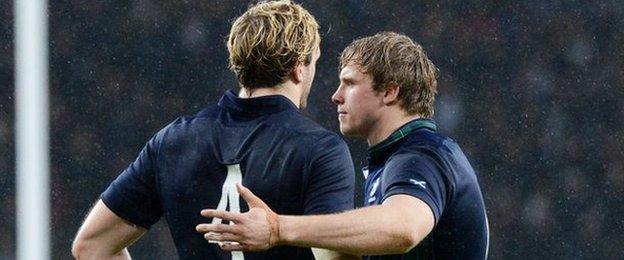
Brothers Ritchie (left) and Jonny Gray console each other after Scotland's defeat
That's how it was for the Wallabies. They couldn't shake Scotland free. When Foley was charged down by Finn Russell, who put Tommy Seymour over in the corner, Twickenham rocked to the tune of a one-point game.
It was now a full-blown classic, a game that will never be forgotten. Hogg made a try-saving tackle on Ashley-Cooper and lifted the siege. Australia came again. Scotland's line-out malfunctioned and they were made to pay for it. Tevita Kuridrani crashed over, Foley added the extras and the gap was six points once more.
Scotland's Swamp Thing stirred again. A penalty from Laidlaw, an intercept try from Mark Bennett, a stadium that was electrified, a world game that was about to be rocked to its very core.
And then those closing minutes. The hit on Hogg ignored. The hellish line-out. The penalty that should never have been. The sweep of Foley's boot forty-three seconds from the end of the 80 minutes that settled it once and for all.
Joubert exited, but he was the only one. The rest of us stood and marvelled at two teams who emptied themselves on the battlefield. Two teams but only one winner. Australia are looking forward to a semi-final against Argentina. And Scotland? They'll be looking back for an awfully long time.
- Published18 October 2015
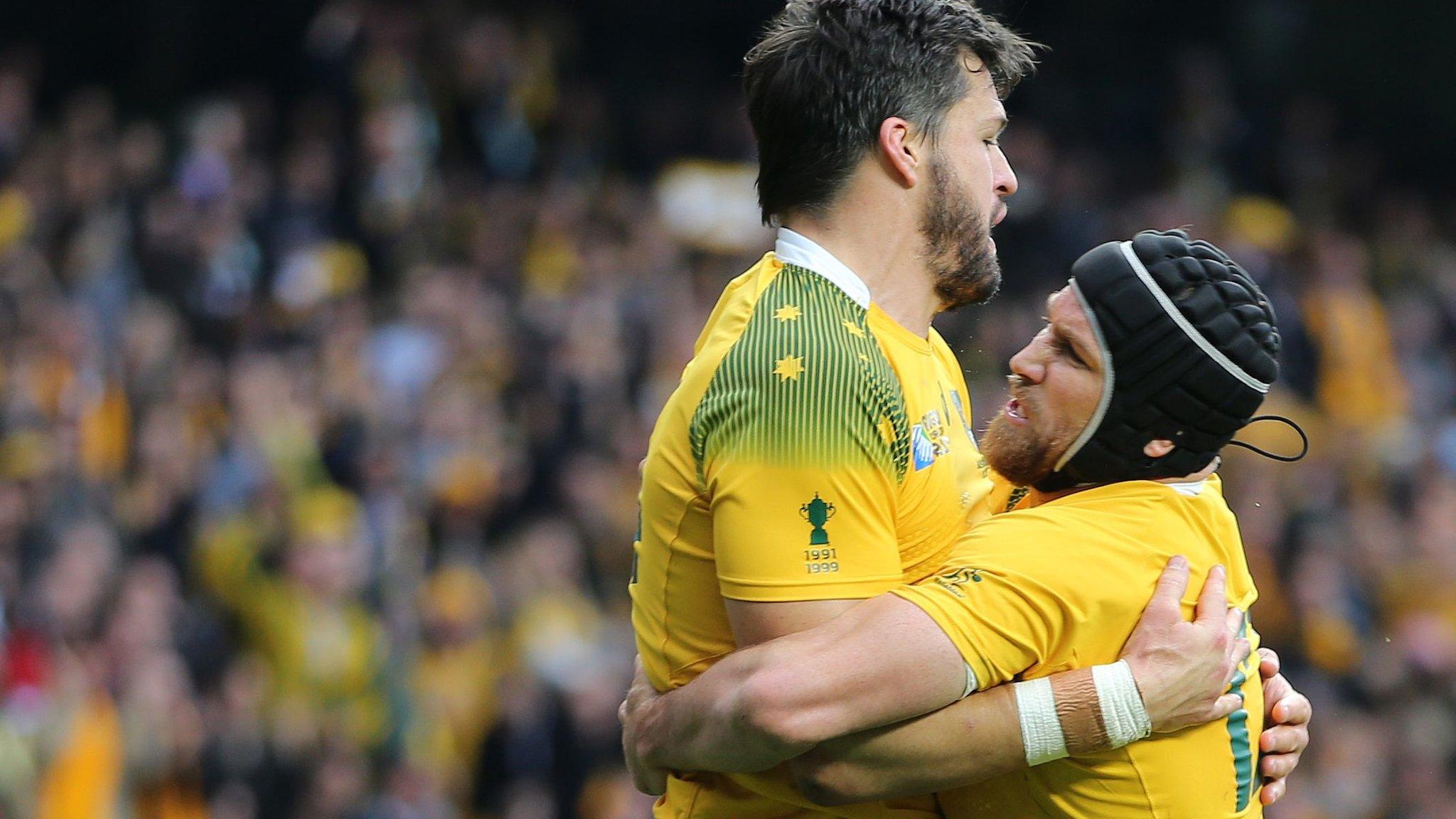
- Published18 October 2015
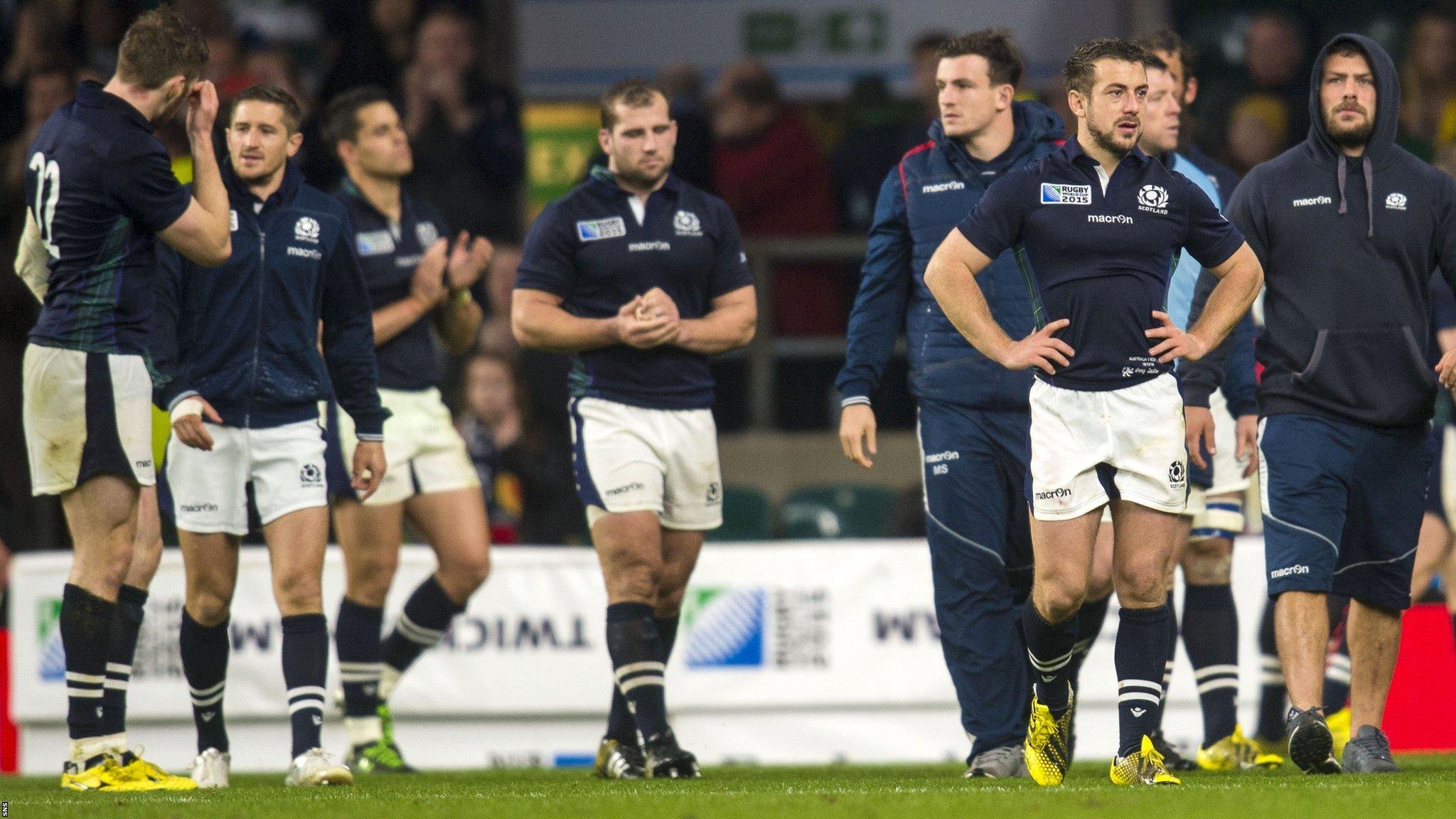
- Published18 October 2015

- Published18 October 2015

- Published14 September 2016
